
The European Union unveiled a raft of measures ranging from boosting renewables and LNG imports to lowering energy demand in its quest to cut dependence on Russian supplies.
The 210 billion-euro ($221 billion) plan announced by the European Commission on Wednesday centers on cutting red tape for wind and solar farms, paving the way for renewables to make up an increased target of 45% of the bloc’s energy needs by 2030. It also agreed on EU-wide emergency rules in the event of a broad supply disruption.
The plan fleshes out the EU’s attempt to reduce purchases of Russian gas by two-thirds this year. But it remains a mammoth challenge, as the country accounted for around 40% of the bloc’s gas imports before the war and finding replacements won’t be easy. The region has also been trying to boost clean power, and some in the EU argue that the risk of a cutoff by Moscow should speed up the pivot.
“We must now reduce as rapidly as possible our dependency on Russian fossil fuels,” European Commission President Ursula von der Leyen said at a press briefing. “This will be speed-charging for our European Green Deal.”
Still, the bulk of the bloc’s strategy relies on finding gas from elsewhere. Liquefied natural gas is set to replace around 50 billion cubic meters a year of Russian supplies, almost a third of the total. African nations such as Nigeria, Senegal and Angola offer largely untapped potential for LNG, the EU said.
Italy’s Eni has already moved to secure supplies from the continent.
Under the latest plans, the EU agreed on common principles for emergency responses should there be a wider supply disruption. It could cap gas prices to avoid “unbearably high” costs if Russia, the region’s biggest supplier, significantly limits or cuts off flows.
To help fund efforts to diversify away from Russian fuel, the EU plans to sell 20 billion euros of permits from its carbon market reserve. That would top up the bloc’s pandemic recovery and resilience facility, but risks making it cheaper for companies to pollute. For immediate energy needs, countries will also be able to deviate from “Do No Significant Harm” rules aimed at preventing environmental damage.
The plans announced Wednesday put a renewed focus on energy savings. The bloc will boost its efficiency goal to reduce consumption by at least 13% from projections made in 2020 versus the current 9%.
It will also come forward with an “EU Save” campaign to encourage citizens to use less fuel. The EU aims to install 10 million heat pumps over the next five years.
Recommended for you
